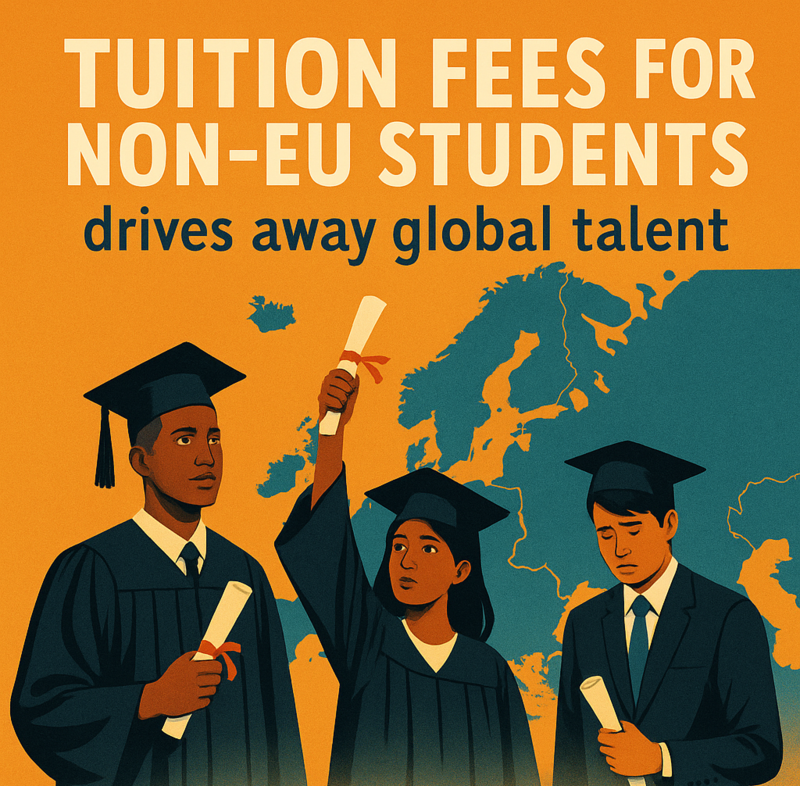Educating for the Future: Why Europe Should Reconsider Tuition Fees for Non-EU Students
Input
Modified
Europe’s long-standing values of education as a public good undermined New tuition-fee policies threatens Europe’s ability to retain global talent and fill workforce gaps Reinstating free or subsidized tuition for non-EU students as a moral imperative and a strategic investment

For decades, non-European Union (non-EU) students have been the financial lifeblood of many European universities. Their tuition fees, while relatively modest compared to those in countries like the United States, have helped support the infrastructure, faculty salaries, and world-class research programs that European institutions are known for. In many ways, these international students have been treated as the “cash cows” of academia—providing much-needed funding without requiring a long-term commitment from their host countries. But that model is now being questioned.
The pandemic, followed by shifting geopolitical alliances and visa restrictions, has caused a sharp drop in the number of international students, especially from China, once a dominant source of tuition revenue. With fewer students and greater global competition for talent, the sustainability of charging non-EU students is coming under scrutiny. While governments may be hesitant to reintroduce free tuition for non-EU students due to budget constraints and political sensitivities, there's a compelling case to be made that doing so might not only be ethical but strategically wise.
A Policy Shift That Shook the System
In 2023, Norway—a country known for its egalitarian education system—passed legislation requiring non-EU students to pay tuition fees. The move marked a significant departure from the country’s long-standing tradition of providing tuition-free education to all. Norway’s government justified the change by citing the increasing number of international students and the financial strain on public universities. There were also concerns about potential abuses of the student visa system, particularly by those using it as a backdoor for immigration.
This shift was not just administrative; it symbolized a broader trend. Countries that had once welcomed international students with open arms began to close the financial doors on them. For some, this was a question of prioritizing limited public funds for domestic students—whose parents had contributed to the national education system through taxes. For others, it was about managing immigration and tightening border controls.
Yet critics of the policy argue that it is short-sighted. The immediate financial relief for universities may come at the cost of long-term competitiveness. Countries like Norway risk losing the global talent that their universities have historically attracted, trained, and often retained.
Across most of the European Union, higher education remains tuition-free or highly subsidized for domestic and EU students. This model rests on the principle that education is a public good, and that the costs should be borne collectively through taxes. Citizens benefit from accessible education, and in return, they contribute to the economy and the welfare state.
For non-EU students, however, the situation is markedly different. While still relatively affordable compared to the U.S. or U.K., tuition fees have become the norm in many countries. This dual-pricing structure creates a two-tier system where access to affordable education is determined by one's nationality.
But what gets lost in this financial arrangement is the long-term value of educated immigrants. Many non-EU students who come to Europe are not just seeking a degree—they’re looking for a future. They want to live, work, and contribute to the societies that educated them. Unlike in the U.S., where visa and employment restrictions often push graduates to return home, Europe has historically encouraged educated foreigners to stay, integrate, and fill skills shortages in key industries.

Europe’s Unique Social Contract
One of the most compelling arguments for reinstating free tuition—or at least dramatically reducing costs—for non-EU students lies in Europe’s own philosophy of education. In many parts of the continent, higher education is not seen as a business, but as a social investment. A degree is not just a private good to be purchased, but a public service extended in the hope that the graduate will contribute back to society. In countries like Germany, this ethos is particularly strong. Many Germans believe that if someone receives a high-quality education for free, they owe it to society to work and pay taxes there.
This philosophy stands in stark contrast to the American model, where higher education is a lucrative industry. U.S. universities often charge international students exorbitant fees while offering little support for post-graduation work opportunities. Once the diploma is awarded, many graduates are expected to leave, having served their financial purpose. Europe’s more inclusive approach could—and should—be its competitive advantage. By offering affordable or free education to talented students from around the world, Europe can build goodwill, attract top minds, and integrate them into its labor market.
As countries like China and India build up their own higher education infrastructure, fewer students are looking abroad. In this environment, Europe must ask itself: What will attract the next generation of global thinkers, scientists, and entrepreneurs? Tuition-free education could be the answer. Offering full or partial scholarships to non-EU students would signal that Europe is serious about remaining a global leader in education and innovation. More importantly, it would show that Europe values diversity—not just as a buzzword, but as a driver of economic and cultural strength.
Of course, reinstating free tuition would require political will and public support. It would mean asking taxpayers to help fund the education of foreigners. But if these educated foreigners stay and contribute—as many are willing and eager to do—the investment will more than pay off. The long-term gains in tax revenue, innovation, and social cohesion would likely outweigh the short-term costs.

A Strategic Imperative, Not Just a Moral One
At the end of the day, the debate about tuition fees for non-EU students is not just about money. It’s about values, strategy, and vision. Does Europe want to be a fortress, guarding its resources against outsiders? Or does it want to be a beacon, attracting the world’s brightest minds and integrating them into its future?
The recent move by Norway may have set a precedent, but it doesn’t have to become the norm. Instead, it can serve as a wake-up call. A reminder that policies rooted in fear or short-term thinking can undermine long-term national interests.
Reinstating free tuition for non-EU students won’t be easy, and it may not happen overnight. But as global competition for talent intensifies, and as demographic pressures mount across Europe, it may be one of the smartest investments a country can make. In the end, educating the world’s best and brightest isn’t just an act of generosity—it’s a strategy for survival.





















